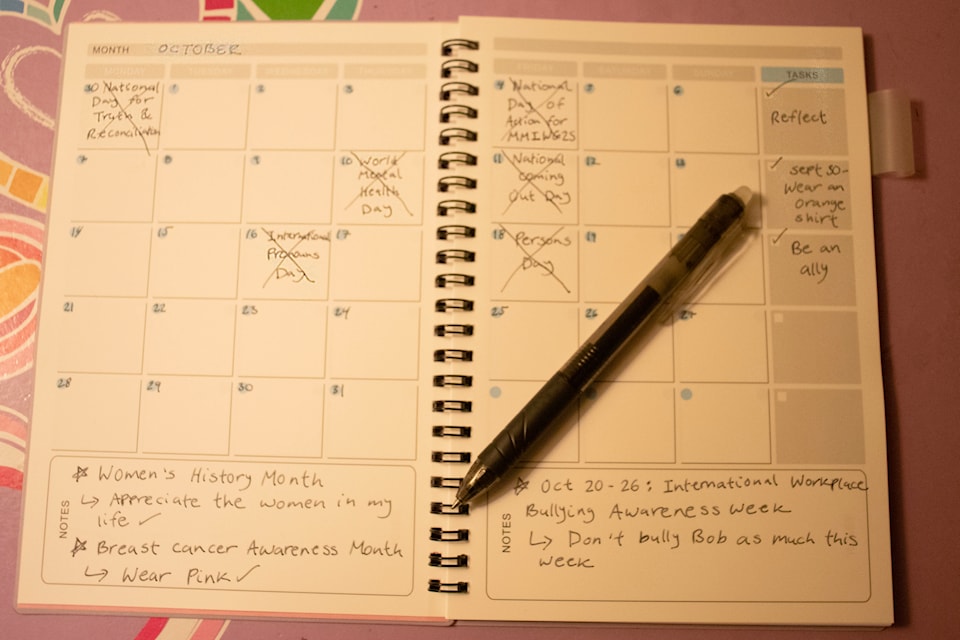The month of October is full of awareness days including National Day of Action for Missing and Murdered Indigenous Women (Oct. 4) and World Mental Health Day (Oct. 10). October is also Women’s History Month.
These awareness days or months can be beneficial but ongoing advocacy and education are crucial.
Canadian certified inclusion professional, Marni Panas, said it is important to create awareness and start conversations but these conversations do end at the end of the day.
“But for me, I don’t get to at the end of that day, take my trans off and be cisgender for the rest of the year. This is my life, all day, every day and the impacts of that for good or challenging don’t go away when the day is over,” Panas said.
“If you are recognizing these days in a way that is about you and is about a benefit to you. In other words, look at me, I’m wearing an orange shirt, I’m wearing a pink shirt, I’m waving a pride flag. If that’s about you, to your benefit, that’s performative,” she said.
Panas said the darkest form of performative allyship that needs to be called out is those in positions of power who come out to a pride event and wave their flag but spend the rest of the year actively denying the rights of people to participate in society.
The Stanford Social Innovation Review said awareness campaigns fall short and waste resources when they focus solely on raising awareness and sometimes can actually end up doing more harm than good.
Nneka Allen, principal and founder of the Empathy Agency, an agency that helps organizational leaders deliver more fairly on their missions and visions, said awareness is a critical component of activism and justice movements but awareness and awareness days are not activism.
“There is a real delineation between information, knowledge and action and activism falls in that action space. And so I think they’re [awareness days] useful, but they shouldn’t be confused with activism,” Allen said.
Integrating these topics into everyday conversation is difficult to do when people lack understanding or even interest in these topics, in our history and in what is going on in our country and in the world.
Indigenous artist, Siera Hancharyk, who goes by she/they pronouns, said ongoing advocacy and education are crucial but emphasized the need to unite and pressure the government system into caring about people.
“Hopefully it [awareness days] open people’s eyes to see the problems in society and hopefully be able to help people out. Most of the time we just watch people suffer and we don’t do anything. We sweep it under the rug or we return the blind eye,” Hancharyk said.
“I hope that there can be policies put in place from our government and organizations that support people with mental health issues as mental health issues are real and detrimentally affect somebody’s life,” they said.
The National Institutes of Health reported in 2015 that if left unaddressed, health awareness days may promote the idea that people’s health challenges are only a result of their own choices, ignoring other important factors.
Leesa Renée Hall, a registered psychotherapist (qualifying), said ultimately, symbolic gestures rarely lead to systemic change and, in this case, we pay attention now and then we move on to the next thing.
“If these events raise awareness, great, but oftentimes what you find is people saying something empty like ‘Oh, I'm going to reflect on this’,” Hall said.
“When it comes to these awareness days, yes, let’s put our attention on that, but what we should be doing 364 other days of the year is taking pen to paper and self-reflecting around your belief system,” she said.
Self-reflection is a step in the right direction. If we can show empathy towards ourselves, it is easier to show others empathy and to care about the bad and struggles in the world and those who deal with it on a regular basis.
Awareness days act to remind people what is going on in the world but tend to oversimplify complicated issues that we may never have a true solution for.
All we can do right now is engage in meaningful conversations, advocate for change and support efforts that address the root causes of these issues as we seek out a mental health professional if needed to help us rebuild resilience.



